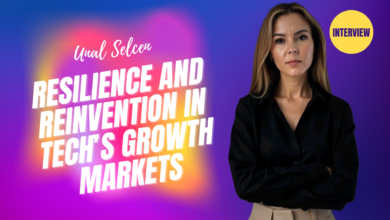“The Lines Between MSPs, ISVs, and System Integrators Are Blurring”

Raship Chhabra, the Regional Channel Manager for GCC at CyberKnight, says, the regional IT channel is undergoing a significant transformation—from traditional resale models to value-driven, solution-oriented partnerships
Could you share an overview of your career path to date, highlighting the pivotal moments or achievements that have shaped your leadership within the IT channel?
My journey in the IT channel began over a decade ago in the Middle East, initially through business development and partner management roles during a period of major digital transformation. A defining milestone was leading a multi-country partner transformation initiative, where I applied strategic foresight, empowered cross-functional teams, and made impactful decisions that helped partners evolve.
This experience cemented my belief in collaborative leadership and the power of a well-built ecosystem. Over the years, I’ve partnered closely with top regional players to co-develop commercially successful and culturally resonant programs tailored to the unique demands of the Middle Eastern market.
As a key channel influencer within your company, what are your primary responsibilities in shaping strategy, driving engagement, and fostering growth within the partner ecosystem?
At CyberKnight, I lead the charge in building a resilient, future-ready partner ecosystem that drives secure digital transformation through a Zero Trust approach. Operating across the Middle East, I design and execute go-to-market strategies, foster adoption of SaaS and cloud-native solutions, and introduce emerging technologies to keep our partners ahead of the curve.
My role bridges our partner network with internal stakeholders to ensure strategic alignment, co-creation of value, and responsiveness to market shifts. Beyond revenue, my focus lies in enabling secure, scalable growth for our partners and customers across the region.
How would you assess the current state and evolution of the IT channel in the region? What major trends are you observing?
The regional IT channel is undergoing a significant transformation—from traditional resale models to value-driven, solution-oriented partnerships. We’re seeing accelerated adoption of cloud, SaaS, application security, and a growing focus on Zero Trust architectures driven by rising cybersecurity threats.
Channel partners are now more embedded in digital transformation projects across sectors like government, BFSI, and telecom, necessitating deep specialization and strong local presence. To remain competitive, the channel must embrace innovation, collaboration, and a security-first mindset.
What is the single biggest challenge facing the regional IT channel today? And what is the most promising untapped opportunity?
The biggest challenge is the urgent need for rapid upskilling and transformation of legacy business models. Many partners struggle to adapt to increasingly complex buying processes and technology stacks, risking stagnation.
Conversely, the greatest opportunity lies in specialization—especially in high-growth areas like OT security, API protection, and data security. Partners who evolve from generalist resellers to trusted advisors offering outcome-based solutions will unlock new revenue streams and long-term relevance.
What strategies can partners adopt to drive sustainable growth and profitability in this changing landscape?
Sustainable growth demands agility and continuous skill development. Partners should embrace a consultative approach—focusing on understanding customer needs, rather than pushing products. Co-selling, joint marketing, and transparent communication with vendors are critical for building trust and driving alignment.
Additionally, transitioning to recurring revenue models such as managed services and subscriptions can ensure profitability and customer stickiness in an increasingly service-oriented market.
How is the rise of AI—particularly Agentic and Generative AI—reshaping the channel’s business models and required skill sets?
AI is revolutionizing the channel by introducing new revenue streams, automation capabilities, and hyper-personalized customer engagement. Partners are now expected to provide AI-integrated solutions—whether in analytics, threat detection, or intelligent automation.
This evolution shifts the channel from transactional engagements to strategic, insight-driven partnerships. Success in this space requires partners to build AI literacy, embrace experimentation, and foster continuous learning across their teams.
With the growing complexity of cyber threats, how can channel partners elevate their cybersecurity offerings to stay ahead?
The future of cybersecurity lies in proactivity and depth. Channel partners must go beyond traditional endpoint or perimeter security and embrace layered, AI-powered strategies. This includes behavior-based analytics, Zero Trust frameworks, and proactive defense mechanisms against sophisticated threats like AI evasion.
Investing in continuous learning, vendor collaboration, and tailored solution design will be key to building trust and delivering differentiated value.
ESG and sustainability are increasingly important. How can channel partners incorporate these values into their operations and create competitive advantage?
ESG isn’t just a regulatory checkbox—it’s a strategic differentiator. Channel partners can embed ESG by adopting green practices, embracing diversity and inclusion, and delivering technology solutions that help customers reduce their carbon footprint. Transparent reporting and responsible governance foster trust and position partners as forward-thinking contributors to both economic and social progress.
What’s your advice for channel partners looking to attract and retain top talent, particularly in high-demand areas like AI, cloud security, and industry-specific tech?
Attracting talent starts with creating a culture of purpose, growth, and innovation. Offering continuous upskilling, clear career paths, and flexible work environments makes organizations more attractive to top talent. Collaboration with universities and tech academies can build a steady talent pipeline and ensure long-term workforce readiness.
How are the roles of MSPs, ISVs, and system integrators evolving, and how can they collaborate more effectively?
The lines between MSPs, ISVs, and system integrators are blurring, creating opportunities for synergistic partnerships. MSPs are expanding their managed service portfolios, ISVs are adding platform intelligence, and integrators are becoming orchestrators of complete solutions.
To deliver maximum value, these players must align strategies, share customer insights, and jointly build outcome-focused, scalable solutions.
What’s your most important piece of advice for partners striving for long-term relevance in the fast-changing IT ecosystem?
Think beyond products—think purpose. Long-term success will come to those who see transformation as a constant, lead with empathy and innovation, and align themselves with future needs—not just present demands. Partners that embrace bold thinking, specialize with intent, and build lasting trust will not just survive the evolution—they’ll lead it.




